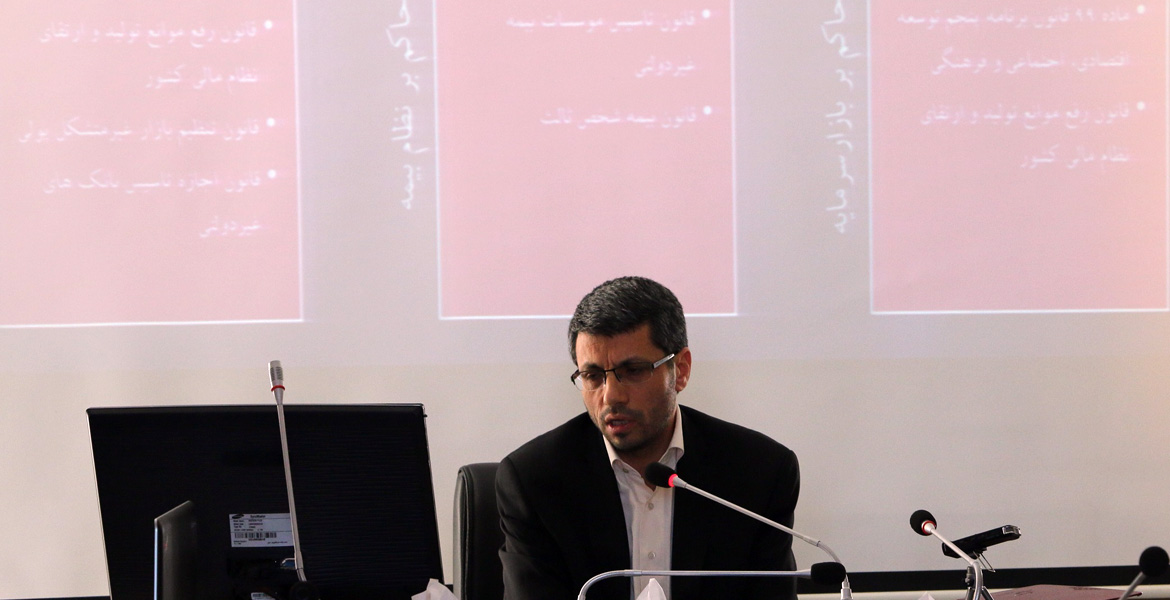
The Iranian Association of Islamic Finance held the 3rd specialized session on Islamic financial legal principles on 7 Mar. 2016.
Dr. Fahimi, Head of the Center for Research, Development and Islamic Studies of the Securities and Exchange Organization, said that from a legal point of view, a system can be called Islamic finance in which financial instruments, procedures and transactions are designed, developed and implemented in compliance with Sharia principles, or at least it mustn’t be incompatible with Sharia principles.
He went on to say that in order to achieve an Islamic financial system, the approach that exists, especially among Muslim communities is to monitor the design and operation of these instruments in both a priori and a posteriori stages. In the previous stage, in the form of establishing the Sharia Supervision Board to try to design institutions and instruments and implement these designs in an Islamic way. In the next stage, a kind of executive and practical supervision is applied to correspond the processes and practices with those designed principles.
Fahimi added in an Islamic financial system, in two stages of designing and implementing, this supervision is carried out to ensure that there is an Islamic financial structure in a country.
He mentioned in general, the group of countries active in the field of Islamic finance are divided into two categories. Some of these countries have an integrated Islamic financial system and the financial system is not dual, but all legal frameworks of these countries are designed in compliance with Sharia principles.
Fahimi said apart from this type, there is another type of financial system that beside conventional economic activities, there is also the Islamic financial sector and this case is also divided into three parts. The first part is the Islamic financial system of countries such as Malaysia, Pakistan and Sudan, which can be referred to as the mandatory Islamic financial system.
He went on to say that the second part is the unorganized and voluntary Islamic financial structure in many Islamic countries, such as the GCC countries and Turkey, where banks do not have to design and issue Islamic financial instruments, but have the authority to do so. The third part is an imitation or adaptation that is mainly found in non-Muslim countries such as the United Kingdom, Luxembourg and the United States that they design and issue Islamic financial instruments based on other Islamic countries.
The reason for establishing the Sharia Committee of the Securities and Exchange Organization is that in our law, degrees of authority have been delegated to the Exchange Organization and the High Council of the Exchange Organization, so this delegation led to establishing this committee in the Securities and Exchange Organization.
He stressed another point that I need to mention is that the essential need of our financial industry after years of activity is the lack of a coordinator institution among different economic sectors, including banks, stock exchanges and insurance and in the current situation many experts have come to the conclusion that there is no separation among these three sectors as expected. Hence, the overlap of activities and the formation of a Stability Council in these economic sectors in order to make a fundamental overhaul in our financial structures are necessary.
Fahimi dealt with the legal principles governing Islamic financial regulation, saying these principles include five cases, the first of which is compliance with the principles of Sharia, and here there is no usury, Gharar, but the observance of other principles of Sharia is considered.
The second principle is related to organization and it is necessary to have an organized financial market. It is said that it is necessary for even our bank branches to issue sukuk, but it is not in compliance with the principles of the Islamic financial market.
The third principle is related to investor protection and the fourth principle is related to information transparency. In this regard, it should be said that the most obvious right of an investor is that if he gives money to another and receives a security in return, it is necessary to have enough information with these funds.
At the end, Fahimi said the fifth principle is related to stability in Islamic financial markets, and it should be said that this principle is one of the most basic instruments for creating the Islamic financial market, which has even made non-Muslims enthusiastic about the Islamic financial market, because it has a mechanism of risk management in its heart.


